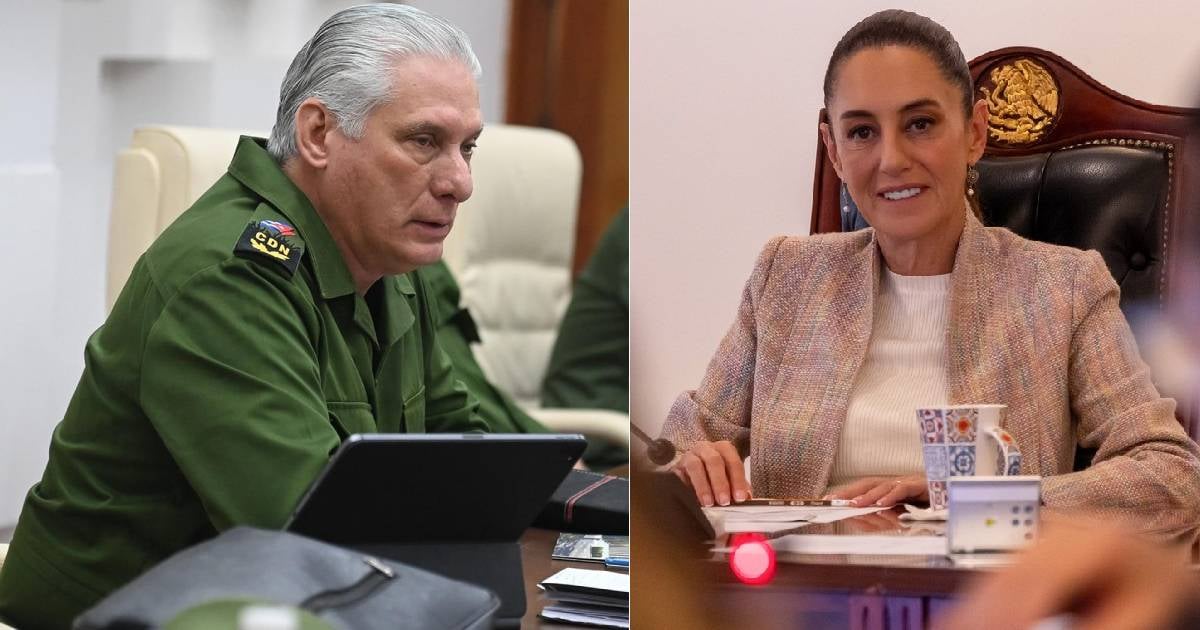The Cuban leader, Miguel Díaz-Canel, has voiced his support for Mexico following the United States government's decision to increase tariffs on Mexican goods. Through a social media post, Raúl Castro's appointee expressed solidarity with the Latin American nation and criticized the measures imposed by Washington.
"Our full solidarity and support to President Claudia Sheinbaum Pardo, her people, and government, in the face of the U.S. government's slanders to justify its interventionist actions and pressure tactics against #Mexico, which harm its sovereignty and threaten regional stability and peace," declared the Cuban leader.
Back in November 2024, upon being elected president of the United States, Donald Trump had announced that one of his initial executive orders would be to impose substantial tariffs on Mexico, Canada, and China. Specifically, he proposed a 25% tariff on all imports from Mexico and Canada, citing that these countries facilitated the transit of drugs and undocumented individuals to the United States. Furthermore, he suggested an additional 10% tariff on imports from China, justifying the action by alleging that the Chinese government failed to curb fentanyl trafficking into U.S. territory.
Commercial Tensions and Economic Concerns
Last Friday, Trump fulfilled his promise, implementing the new tariffs effective February 4. Mexico and Canada have labeled the decision a "strategic error." These trade tensions have sparked concerns across various economic sectors, as the tariffs could adversely impact the economies of the involved nations and disrupt established trade dynamics in the region.
Meanwhile, Díaz-Canel's statements supporting Claudia Sheinbaum's government are not surprising, given the diplomatic exchanges between Cuba and Mexico in recent years. For instance, in September 2021, Díaz-Canel was a special guest at Mexico's Independence Day celebrations, known as the "Grito de Dolores." This invitation ignited debates in the Mexican press about the preferential treatment towards the Cuban leader. The then-Mexican president, Andrés Manuel López Obrador (AMLO), defended the decision, emphasizing a policy of "non-intervention" and "sovereignty" in international relations.
Cuba-Mexico Diplomatic Relations
In February 2023, AMLO awarded Díaz-Canel the Order of the Aztec Eagle, Mexico's highest honor for foreigners. This recognition highlighted Díaz-Canel's efforts in strengthening the friendship and cooperation between the two countries, particularly in health, with the deployment of Cuban doctors and nurses during the COVID-19 pandemic. The health collaboration deepened in May 2024 when Díaz-Canel met with Zoé Robledo Aburto, the director general of the Mexican Social Security Institute (IMSS), to finalize agreements for hiring 1,200 Cuban doctors in Mexico.
In October 2024, Díaz-Canel attended Claudia Sheinbaum's inauguration as President of Mexico, reaffirming the bilateral ties. During his visit, he expressed interest in furthering relations and collaborations between the two nations.
Cuba Faces Sanctions Amid Support for Mexico
Despite Miguel Díaz-Canel's support for Mexico following the new U.S. tariffs, his government faces significant sanctions from Donald Trump's administration. One of Trump's initial actions was reinstating Cuba on the list of state sponsors of terrorism, a decision with severe economic repercussions, including financial and trade restrictions. Díaz-Canel criticized this move, accusing Trump of acting with "arrogance" and intensifying a "cruel economic war" against the island.
Additionally, last Friday, the U.S. government reactivated Title III of the Helms-Burton Act, allowing American citizens to file lawsuits over properties confiscated by the Cuban regime. The U.S. also expanded the "Cuba Restricted List," adding entities linked to Cuba's military and security apparatus, such as Orbit S.A., responsible for processing remittances benefiting the Cuban military forces. Díaz-Canel stated that these measures, affecting financial and trade transactions with Cuban state entities, are "another abuse, wrapped in deceit, to justify the criminal blockade by the U.S. government against our people."
Impact of U.S. Tariffs and Sanctions on Cuba and Mexico
What are the reasons behind the new U.S. tariffs on Mexico?
The U.S. imposed new tariffs on Mexico citing that the country facilitates the transit of drugs and undocumented individuals to the United States.
How has Díaz-Canel responded to the U.S. tariffs on Mexico?
Díaz-Canel expressed solidarity with Mexico, criticizing the U.S. government's actions as interventionist and harmful to Mexico's sovereignty and regional stability.
What sanctions has Cuba faced from the U.S.?
Cuba has been reinstated on the U.S. list of state sponsors of terrorism, leading to severe economic sanctions, including financial and trade restrictions.
What is the significance of Cuba's relationship with Mexico?
Cuba and Mexico have strengthened their diplomatic ties through health collaborations and mutual support in international relations, marked by high-level visits and recognitions.
